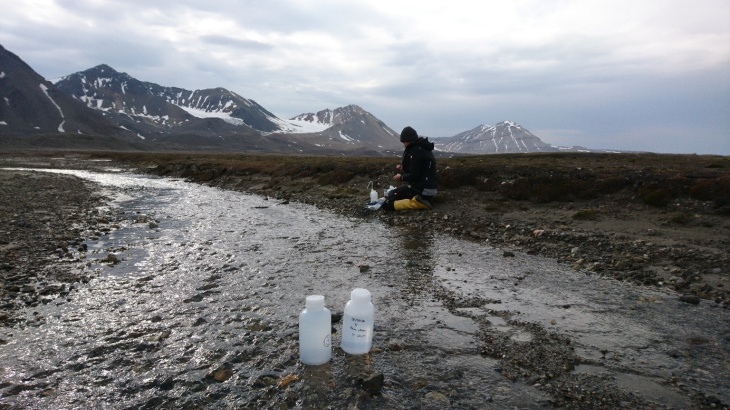Glacial Melt Endangers Ecosystems
The Arctic regions are particularly vulnerable to climate change. However, comprehensive scientific information about environmental changes in these areas remains lacking. Researchers from the Helmholtz-Zentrum Hereon have now investigated inorganic carbon parameters, nutrients, and trace elements in fjord systems. The findings: The melting glacial ice alters the chemical composition of the water in fjords, destabilizing ecosystems. The study was recently published in the journal Global Biogeochemical Cycles.

Hereon researcher Claudia Schmidt during sampling. Photo: AWI/ Grit Steinhöfel
The case study is based on an expedition to Kongsfjorden on the west coast of Svalbard and the German-French research station Arctic Research Base Ny-Ålesund (AWIPEV) located there. Researcher Claudia Schmidt from the Hereon Institute of Carbon Cycles studied how glacial freshwater runoff affects the total concentration of nutrients, trace elements, and carbon parameters in the Arctic fjord. She collected water samples along the fjord axis and from rivers, observing biogeochemical changes in coastal waters.
The freshwater inflow creates a barrier layer on the highly saline fjord water, altering the circulation of water masses as well as the distribution of nutrients and trace elements. One potential consequence is a reduction in phytoplankton, which forms the basis of the marine food chain. Its availability impacts many ocean organisms, biodiversity, and significantly, the sequestration of CO₂. A potential decline in phytoplankton would reduce the uptake and storage of the greenhouse gas CO₂.
A Campaign with Great Dedication
The water sampling was conducted in collaboration with the Alfred Wegener Institute, Helmholtz Centre for Polar and Marine Research (AWI). The researchers filtered the water in a laboratory on Svalbard and later analyzed it in Geesthacht and Bremerhaven. The 2020 expedition was part of the project "Arctic biodiversity change and its consequences: Assessing, monitoring, and predicting the effects of ecosystem tipping cascades on marine ecosystem services and dependent human systems", abbreviated as ECOTIP. Over the past four years, this interdisciplinary project has involved 16 research institutions from 10 countries. It was funded under the EU's Horizon 2020 research and innovation program, with Hereon receiving 700,000 Euro.
